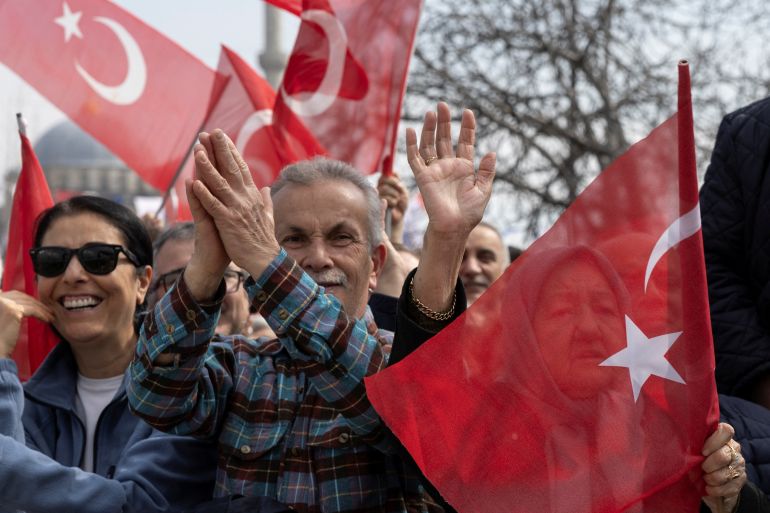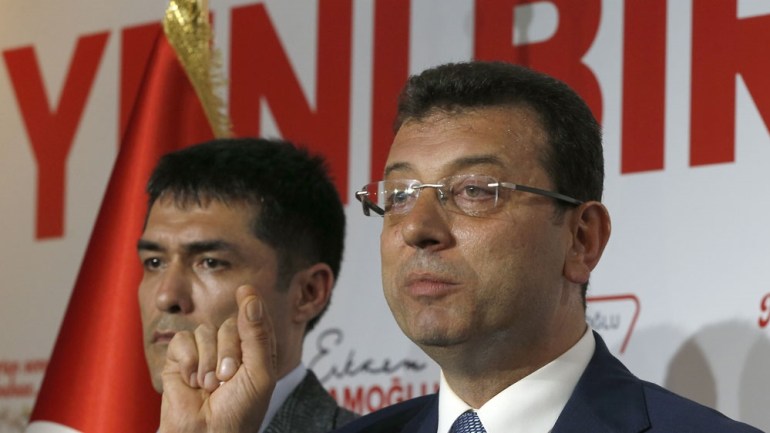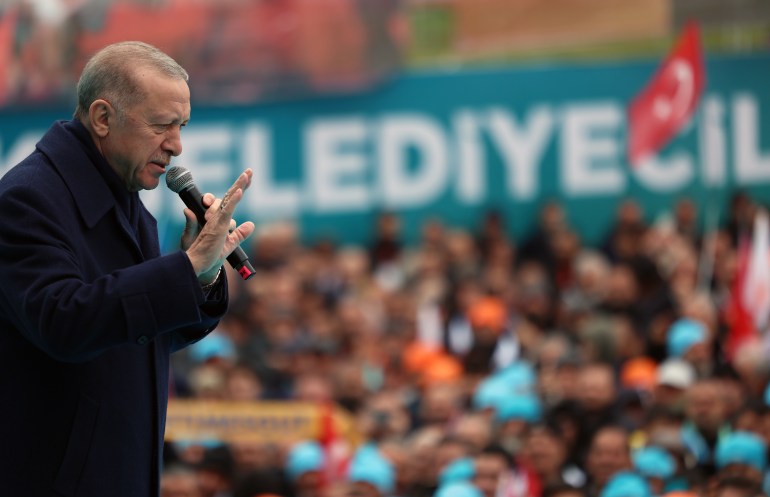Turkey’s opposition in electoral battle to keep hold of major cities
CHP has control of local government in Istanbul and Ankara, but may find it hard to keep hold of them in March 31 local elections.

Istanbul, Turkey – Across much of the world, local elections generate little interest beyond the town hall but in Turkey, voting for officials ranging from metropolitan mayors to neighbourhood representatives grips the nation for weeks ahead of polling day.
Despite having turned out for presidential and parliamentary polls only 10 months ago, Turkish television and newspapers have been full of news, opinion and debate on the March 31 local vote.
Keep reading
list of 3 itemsTurkey detains 7 suspected of spying for Israel
Earthquake fever grips Turkey’s Istanbul amid fears of ‘the big one’
Across the country, voters will elect more than 23,000 officials but most attention will be on the mayors picked to run Turkey’s 30 largest cities.
This is especially true in Istanbul, the country’s most populous city and its economic powerhouse, where an opposition victory in 2019 was seen as a setback in President Recep Tayyip Erdogan’s largely flawless electoral record.
The weight of Istanbul
Victory for the Republican People’s Party (CHP) in Istanbul five years ago ended the city’s 25 years of rule by Erdogan’s Justice and Development Party (AK Party) and its conservative predecessors.
The loss of Istanbul also struck a personal note for Erdogan, who was born and raised in the city and served as its mayor in the 1990s.
Ejder Batur, deputy chairman of the AK Party’s Istanbul branch, cited Erdogan’s spell as mayor as one of the factors behind his success on the national stage and a sign of why local polls have such significance.

“He provided great contributions and services to the daily lives of Istanbulites … and this bond he established with them was a tool that brought him to power in the central administration,” Batur said.
“Istanbul has a symbolic significance in every election and all the big cities now have CHP mayors apart from Bursa, the fourth-biggest city,” said CHP Deputy Chairman Ilhan Uzgel.
Istanbul’s 2019 result was mirrored in the capital Ankara and Antalya, leaving the CHP in control of four of the five biggest cities, accounting for one-third of Turkey’s population.
Retaking Istanbul would also give the AK Party the opportunity to sideline its CHP Mayor Ekrem Imamoglu, who is seen as a potential presidential challenger in the future.
This year’s election will see some 35 political parties taking part across Turkey. The level of participation is such that voters in Istanbul will be given a ballot paper nearly a metre (3 feet) wide to accommodate 49 mayoral candidates, including 27 independents.
The race in Istanbul, however, will be chiefly between incumbent Imamoglu and AK Party candidate Murat Kurum, a former environment minister.
Opinion polls suggest the race is neck and neck. Metropoll, one of Turkey’s more respected pollsters, put Imamoglu 3.3 percentage points ahead of Kurum in its February survey.
Splintering opposition
In securing a majority in parliament and another five-year presidential term last year, the AK Party and Erdogan – who has had 20 years in power – dealt a heavy blow to opposition morale.
Across the country, the starkest difference to the 2019 local elections is the collapse of the opposition alliance after last year.
The nationalist IYI Party has split from the CHP while the Kurdish-focused party – now renamed as the DEM Party – has also decided to field its own candidates against the CHP, something it did not do in 2019.
Metropoll data from January and February shows declining support for Imamoglu among voters from these parties, the two largest opposition blocs after the CHP.
Last month, 32 percent of DEM Party voters backed Imamoglu, down from 35 percent in January, while the proportion of IYI Party supporters dropped from 64 percent to 45 percent.
The CHP itself is also reeling from losing last May’s presidential and parliamentary elections.
It had hoped to unseat Erdogan in the face of economic turmoil and the fallout from February’s devastating earthquakes in southern Turkey.
Wolfango Piccoli, co-president of New York-based global risk advisors Teneo, said the local election will be a “litmus test” for the CHP.
“The opposition control of Turkey’s main cities, especially Istanbul, represents its last meaningful holdout,” he said. “After last year’s elections, opposition voters are already disillusioned. The outcome of the upcoming local elections could be decisive for [opposition] voters’ morale.”
Uzgel also acknowledged “a psychological and emotional break” among CHP supporters. “There was a sudden breakdown of morale among the electorate so we’re trying to regain confidence and morale in this election,” he said.
Momentum
The AK Party, however, also faces a split in its ranks with the New Welfare Party (YRP) deciding to leave its coalition and stand on its own, a move that could take votes away from AK Party candidates.
“There is no possibility of the New Welfare Party winning elections in the places where it takes part but since it is participating … it increases the CHP’s chances of winning,” AK Party Deputy Chairman Efkan Ala told state-run Anadolu Agency earlier this month.
Nevertheless, commentators say the momentum lies with the AK Party. Erdogan has taken charge of the local campaign, appearing nearly daily at rallies.

Uzgel, meanwhile, feels the “dilemma of Erdogan’s political style” – his dominance of Turkish politics overshadowing local AK Party politicians – would benefit “strong” opposition candidates such as Imamoglu.
In the wake of last year’s earthquakes, the AK Party is focusing its campaigning on making urban centres more quake-resistant as well as improving transport in traffic-choked cities.
It has criticised Istanbul’s CHP-run municipality, saying it had been unable to improve earthquake preparedness – a claim the CHP has responded to by blaming blocked government funds.
“[The CHP in Istanbul has] failed spectacularly, especially in transportation and earthquake-resistant urban transformation, and these two issues are the most important agenda items for our fellow citizens in Istanbul today,” said Batur.
The AK Party’s “people-oriented” policies, he added, would triumph in the face of the opposition’s “inability to fulfil the promises it made five years ago”.